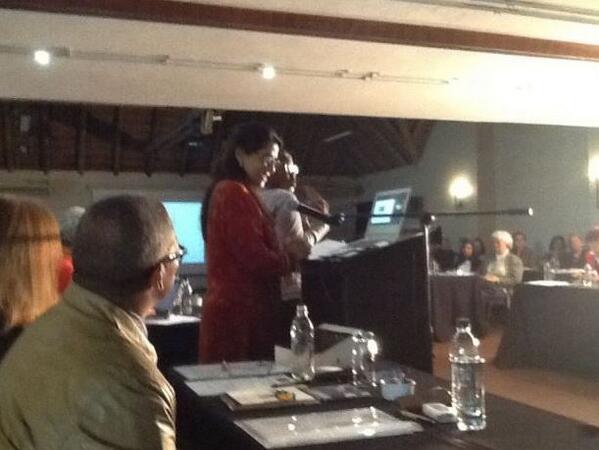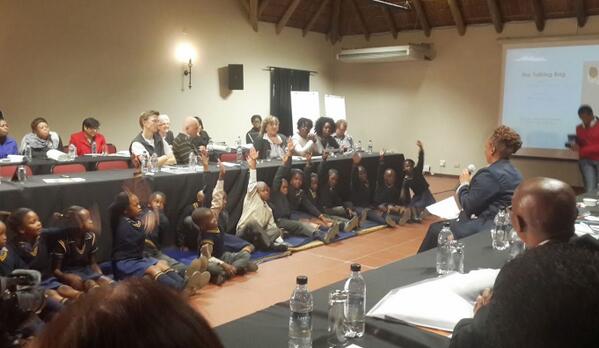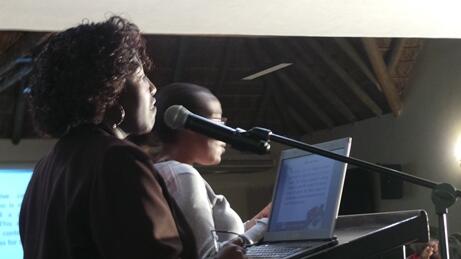Recently, on 3rd and 4th June, I was privileged to attend a Multilingual Symposium on Literacy Development funded by the European Union at the Leriba Hotel in Centurion, Pretoria. Delegates hailed from the UK, USA, Canada, Uganda, Kenya, India, Mozambique and local including representatives from the Department of Basic Education. The reason that I was there is that I am involved in the wonderful African Storybook Project as part of my work for SchoolNet. This was a very interesting event and I thought I would write about ten of my takeways.
1. The launch of the African Storybook Project website
The most exciting part of the event, in my opinion, was the launch of the long-waited African Storybook Project website. I am sure this must be Africa's first multilingual website for young readers http://africanstorybook.org/. It was created with funding from Comic Relief in Britain to address the serious literacy challenges on the African continent. In preparation for the launch of the ASP website, the African Storybook team was hard at work quality assuring over 120 unique, illustrated stories, with over 650 versions in 15 different languages. The team put together by Saide in Johannesburg have done a wonderful job.

3. A practical workshop run by the Nal'ibali team
8. Kenya's ICT rollout plan for 2015
Esther Gacicio (Kenyan Institute for Curriculum Development) spoke very clearly on how the Kenya Ministry of Education plans on rolling out the ICT Strategy in schools in the light of the renewed policy on the use of mother tongue in early literacy. In Kenya 1500 district masters and 20,000 teachers have been trained on ICT integrated lesson plans. This policy starts with a roll out to Grade 1.

Those are just a few of the many highlights from a really interesting two-day Symposium. All the participants were also given a flash drive with useful materials on it to take home.
Tweet archive from the multilingual Symposium
A summary of the tweets from the Symposium have been archived using www.storify.com and can be viewed at https://storify.com/fibeal/the-eu-symposium-and-launch-of-the-african-storybo

1. The launch of the African Storybook Project website
The most exciting part of the event, in my opinion, was the launch of the long-waited African Storybook Project website. I am sure this must be Africa's first multilingual website for young readers http://africanstorybook.org/. It was created with funding from Comic Relief in Britain to address the serious literacy challenges on the African continent. In preparation for the launch of the ASP website, the African Storybook team was hard at work quality assuring over 120 unique, illustrated stories, with over 650 versions in 15 different languages. The team put together by Saide in Johannesburg have done a wonderful job.

SchoolNet played a part in this project by initially being part of the website creation brainstorming team, and thereafter creating and running a four-week online digital storytelling course for teachers around South Africa in 2013. Some of the stories created during the course feature on the website. The course will be held again from the beginning of the third term and will be advertised on the SchoolNet blog and website. On the last day of the Symposium everyone had an opportunity to attend a wonderful, practical workshop and demonstration on creating and using multilingual digital stories with young readers.We were able to experiment with the story creation and versioning tools on the African Storybook Project website.Please follow the African storybook project on the following social media platforms to keep up to date with this project:
Twitter - @africanstorybook
Facebook – africanstorybookorg
The really exciting feature of this website is that the stories can be downloaded, translated on the website, reversioned etc all because of the OER Creative Commons license that is used, You are able to create a new version of a story and adapt it for your own purposes.
2. A keynote from Suzanne Singh of Pratham Books, India
I really enjoyed the inspiring keynote from Suzanne Singh from Pratham Books in India on the role of alternative publishing models in facilitating multilingual literacy development. She emphasised that books inspire us to dream and they give us the tools to dream. Pratham Books targets children who don’t normally have access to books.
Twitter - @africanstorybook
Facebook – africanstorybookorg
The really exciting feature of this website is that the stories can be downloaded, translated on the website, reversioned etc all because of the OER Creative Commons license that is used, You are able to create a new version of a story and adapt it for your own purposes.
2. A keynote from Suzanne Singh of Pratham Books, India
I really enjoyed the inspiring keynote from Suzanne Singh from Pratham Books in India on the role of alternative publishing models in facilitating multilingual literacy development. She emphasised that books inspire us to dream and they give us the tools to dream. Pratham Books targets children who don’t normally have access to books.
 |
| Suzanne Singh from Pratham Books delivering her keynote |
Pratham Books see themselves as a community publisher and they have their books available on most platforms - using technology enables stories to travel far and wide. They have discovered that the free books catalyse the sales of the sold books. They also find that open stories multiply. Their social publishing model opens publishing through creativecommons licensing and enables the remixing and porting of stories.
3. A practical workshop run by the Nal'ibali team
The Nal'ibali team’s practical workshop on using stories to develop a culture of reading was most enjoyable. We experienced a reading club! We were shown how a story comes to life with reading, acting, singing and movement and so much more. Nal'ibali has 180 reading clubs in 6 provinces in South Africa reaching around 5000 weekly participants. Nal'ibali produces a regular supplement in the Times every week with stories and ideas that can be folded, cut and used in the classroom. All their supplements can be downloaded from their website. You can find out more about Nal'ibali by visiting their website http://nalibali.org/. Nal'ibali has developed a Children’s Literacy Charter. Carol Bloch can be seen below showing the Charter to the workshop participants.
4. Language ability in the contemporary context
Professor Lilli Pretorius from Unisa spoke on language ability in contemporary context. I found this presentation extremely interesting. She quoted the findings from many interesting studies. Storybooks are not only about the magic of reading but they have huge cognitive implications. The slide below indicates the relative richness of input in the acquisition of vocabulary.
5. Story presentations provided for our entertainment
The entertainment at the conference was in the form of story performances from Marlene Winberg and Kapilolo Mario Mahongo (San Memory House and Manyeka Arts Trust). Marlene would give the English version of the story and Kapilolo gave the African version.
The entertainment at the conference was in the form of story performances from Marlene Winberg and Kapilolo Mario Mahongo (San Memory House and Manyeka Arts Trust). Marlene would give the English version of the story and Kapilolo gave the African version.
 |
| Marlene Winberg and Kapilolo Mahongo assisted by a sign language interpreter |
6. Atteridgeville learners respond to ASP stories
Learners from the African Storybook Project pilot primary schools in Atteridgeville joined us with their teachers to read and respond to stories on the African Storybook website. This was a delightful part of the proceedings.
Learners from the African Storybook Project pilot primary schools in Atteridgeville joined us with their teachers to read and respond to stories on the African Storybook website. This was a delightful part of the proceedings.
 |
| Young learners from Atteridgeville Primary respond to stories |
7. The Department of Basic Education's new ILAL multilingual policy
Representatives from The Department of Basic Education spoke on challenges in the piloting of the Incremental Introduction of African Languages (IIAL) strategy and the need for resources. The policy is Home Language plus 2 Additional Languages. The interesting part of this presentation was the critique and the comments from the crowd!
Representatives from The Department of Basic Education spoke on challenges in the piloting of the Incremental Introduction of African Languages (IIAL) strategy and the need for resources. The policy is Home Language plus 2 Additional Languages. The interesting part of this presentation was the critique and the comments from the crowd!
8. Kenya's ICT rollout plan for 2015
Esther Gacicio (Kenyan Institute for Curriculum Development) spoke very clearly on how the Kenya Ministry of Education plans on rolling out the ICT Strategy in schools in the light of the renewed policy on the use of mother tongue in early literacy. In Kenya 1500 district masters and 20,000 teachers have been trained on ICT integrated lesson plans. This policy starts with a roll out to Grade 1.
 |
| Esther Gacicio explaining the Kenyan ICT Strategy |
9. Mary Metcalf's report back on the PILO project in KZN
Mary Metcalfe talked about improving reading outcomes through teaching reading in school through shared reading sites. She is currently involved in the PILO project aimed at improving early literacy in KZN. Reading outcomes depend on the accountability of the state in providing suitable support conditions in schools.

Mary Metcalfe talked about improving reading outcomes through teaching reading in school through shared reading sites. She is currently involved in the PILO project aimed at improving early literacy in KZN. Reading outcomes depend on the accountability of the state in providing suitable support conditions in schools.

10. The importance of inclusive education in early childhood development
David Crabtree (Consultant to the British Council on Special Educational Needs) spoke about the importance of inclusive education for early childhood development. He emphasised that teachers need two skill sets - their subject knowledge and knowing how learning occurs in diverse students.

Those are just a few of the many highlights from a really interesting two-day Symposium. All the participants were also given a flash drive with useful materials on it to take home.
Tweet archive from the multilingual Symposium
A summary of the tweets from the Symposium have been archived using www.storify.com and can be viewed at https://storify.com/fibeal/the-eu-symposium-and-launch-of-the-african-storybo









No comments:
Post a Comment